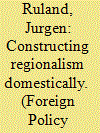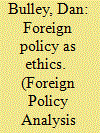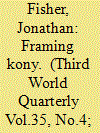| Srl | Item |
| 1 |
ID:
131062


|
|
|
|
|
| Publication |
2014.
|
| Summary/Abstract |
There is a dearth of studies exploring the construction of ideas on regionalism outside Europe. This article seeks to make a contribution to close this gap. It examines the construction of ideas on regionalism in Indonesia, the largest member country of the Association of Southeast Asian Nations (ASEAN). Theoretically, the paper draws from Acharya's concept of "constitutive localization" which it develops further. It offers an alternative explanation to studies which argue that as a result of mimetic behavior, social learning, and cost-benefit calculations, regional organizations across the world become increasingly similar. While this may be the case in terms of rhetoric and organizational structure, it is not necessarily the case at a normative level. The Indonesian case shows that even though foreign policy stakeholders have increasingly championed European ideas of regional integration after the Asian Financial Crisis of 1997/1998, they have skillfully amalgamated them with older local worldviews through framing, grafting, and pruning. European ideas of regional integration thereby served to modernize and relegitimize a foreign policy agenda which seeks to establish Indonesia as a regional leader with ambitions to play a major role in global politics.
|
|
|
|
|
|
|
|
|
|
|
|
|
|
|
|
| 2 |
ID:
131061


|
|
|
|
|
| Publication |
2014.
|
| Summary/Abstract |
This article notes that while ethics is increasingly talked of in foreign policy, it remains a blindspot for foreign policy analysis (FPA). It argues that this must be rectified through a critical approach which conceptualizes foreign policy as ethics. The first section examines how even constructivist approaches, which are highly attuned to the intersubjective sphere, still generally avoid dealing with morality. The second section looks at the possibilities and limits of one piece of constructivist theorizing that explores the translation of morality into foreign policy via "norms." This demonstrates the problems that a constructivist account, with its tendency toward explanatory description without evaluation, will always face. The final section argues, through an examination of EU foreign policy (from 1999 to 2004) and its innovative use of "hospitality," that FPA must critically reassess the value of the norms and principles by which foreign policy operates in order to suggest potentially more ethical modes of encounter.
|
|
|
|
|
|
|
|
|
|
|
|
|
|
|
|
| 3 |
ID:
133263


|
|
|
|
|
| Publication |
2014.
|
| Summary/Abstract |
This article explores the influence of actors and organisations outside the corridors of power in Washington, DC on US 'crisis foreign policy making' in Africa. Focusing on the case of US policy towards the lra/northern Uganda crisis - particularly the Obama administration's 2011 decision to send 'combat-equipped US forces' to pursue the rebel group across central Africa - it is argued that the role of African governments themselves merits greater consideration. The decision to send in these 'military advisers' was arguably strongly influenced by campaigns run by Western policy institutes, notably the International Crisis Group, and US advocacy groups since around 2007. The Ugandan regime of Yoweri Museveni has - it is suggested - nevertheless itself fundamentally shaped the nature and direction of the debate into which such groups have entered. This raises crucial questions about the agency of African governments in Western 'crisis' decision-making fora.
|
|
|
|
|
|
|
|
|
|
|
|
|
|
|
|
| 4 |
ID:
132527


|
|
|
|
|
| Publication |
2014.
|
| Summary/Abstract |
This article aims to discuss and analyze the emergence and evolution of Turkey's role as a model in the international system in three different periods, 1991-93, 2003-05 and 2010-12. To this end, it methodologically uses the main concepts of role theory: role expectations, role conceptions and role performance. Focusing on K.J. Holsti's example national role conception category in particular, it seeks to reveal the major similarities and differences between the role expectations that have enacted the role conception known as the Turkish model, and compare the impact of these expectations on role performance in each of these three cases. The major argument of the article is that the sustainability of the model's national role conception depends foremost on Turkey's political and economic capabilities that directly influence its role performance.
|
|
|
|
|
|
|
|
|
|
|
|
|
|
|
|